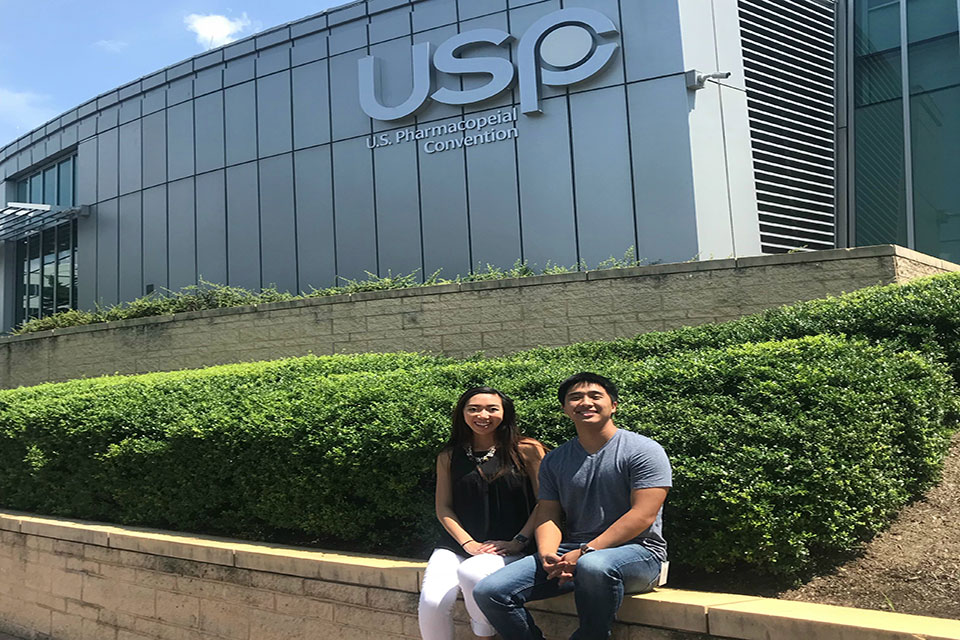Summer Reflections: USP Sets the Standards for a Meaningful Internship
Written By: Michelle Nguyen, Second-Year Student Pharmacist, and Khang Nong, Third-Year Student Pharmacist
Editor’s Note: This post is the third in a series of Summer Reflections authored by student pharmacists at the School of Pharmacy who participated in study abroad experiences during their summer breaks.
Before this summer, neither of us knew much about the United States Pharmacopeia (USP). Many questions spiraled through our minds as we stepped into what would later prove to be eye-opening internships at an incredibly impactful institution. Headquartered in Rockville, Md., the USP, we learned, is a non-profit, standards-setting organization that promotes global public health to ensure the quality and safety of food and medicine. Though other countries have their own pharmacopeias, many refer to the USP as the pillar of standards. As student pharmacists, we had an amazing opportunity to intern in the pharmacist’s hub of the USP – the Healthcare Quality and Safety (HQS) Division.
An Exploration of Non-Traditional Pharmacy Careers
As told from Michelle’s Perspective
Interning with the USP was one of the most valuable experiences that I’ve had in my early career: challenging, yet eye-opening. I discovered a whole new side of pharmacy that extends beyond the dispensing counter, working for an institution that’s continually developing innovative solutions to the world’s current public health issues. As a first-year student applying to summer internships, I wanted to explore new and diverse pharmacy experiences, especially those in the non-traditional sector. Living in Montgomery County, I’ve driven past the USP countless times and joked that I would someday work there. Imagine my surprise when I stumbled upon their internship program and found myself as an intern in the HQS Division this summer.
What surprised me the most during my time at the USP was how interns were immediately immersed in the HQS Division. Everyone was so friendly and accessible, willing to help acclimate this young and naïve pharmacy student to her new environment. The culture at the USP is very mission-driven, with hardworking professionals who have a true passion for promoting public health. Beginning on the first day of my internship, I dove into the Allergies and Intolerances Non-Compendial Standard. I worked to develop a comprehensive, standardized value set for documenting and encoding adverse events in an allergy module of an electronic health record to ultimately establish any potential drug cross-reactivity. During my time at the USP, I had numerous opportunities to work on novel and acute assignments, such as the General Chapter <17> Prescription Container Labeling Report Card, allowing me to fully soak in the culture at the USP. It was eye-opening to see all of the simultaneous projects that the HQS Division worked on, from parenteral nutrition and compounding to opioids and allergies.
Outside of my main project, I found myself immersed in a number of meetings with corporate chain pharmacies, national pharmacy organizations, and even U.S. senators and health care professionals from other countries. It was incredible to see pharmacy from this new angle and discover the global impact of USP standards. As an intern, I had the chance to network with other pharmacy interns at organizations such as the American Society of Health-System Pharmacists (ASHP) and the American College of Clinical Pharmacy (ACCP), allowing me to establish valuable professional relationships. I’ve always heard that there was a wide range of opportunities in the pharmacy realm, but interning at the USP really opened my eyes to all that this field has to offer.
An Opportunity to Grow a Strong Professional Network
As told from Khang’s Perspective
I first learned about the opportunity to intern with the USP when I met another student at the Academy of Managed Care Pharmacy’s (AMCP) Annual Conference in 2017, who was preparing to start her internship at the organization. I expressed an interest, and earlier this year, she followed up to let me know that she had recommended me to her preceptor.
Fast forward to now, and I have just finished my internship with the HQS Division, working with the Strategic Marketing and Program Operations Division. My specific projects included identifying key stakeholders to whom new standards and general chapters would be targeted, collaborating with companies and businesses to discover market compatibility, and conducting health economics research to analyze the cost-benefit of implementing these new standards. As an intern, I was also given the opportunity to attend career development/professionalism workshops and expert committee meetings where new standards were being developed. I also participated in site visits where we were engaged in networking events with pharmaceutical associations, such as AMCP and the Pharmacy Quality Alliance.
My biggest takeaway from this experience was how important it is to meet everyone, practice networking, and develop meaningful professional relationships. There are so many personal connections to be made from internships like this, where students can meet professionals from all different backgrounds and disciplines — from clinical pharmacists to former chief science officers of major pharmaceutical companies. It is important to leverage these opportunities to promote ourselves and stay connected with those in the field. If I had not networked at the conference where I met the previous intern, I probably would not have had the opportunity to complete this internship. It was an amazing opportunity that I would recommend to anyone in any health care discipline. Whether you are interested in providing clinical care at a hospital or working in the business side of the pharmaceutical industry, there is so much to be learned and gained from interning with the USP.

